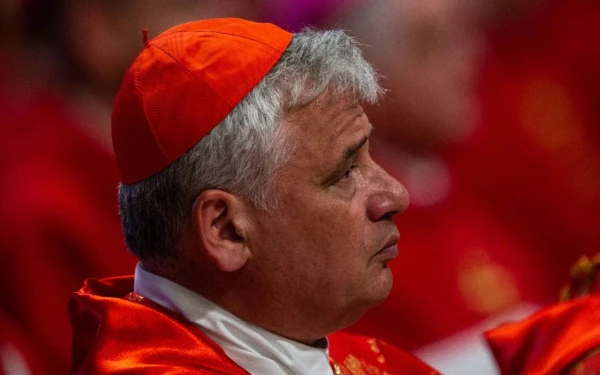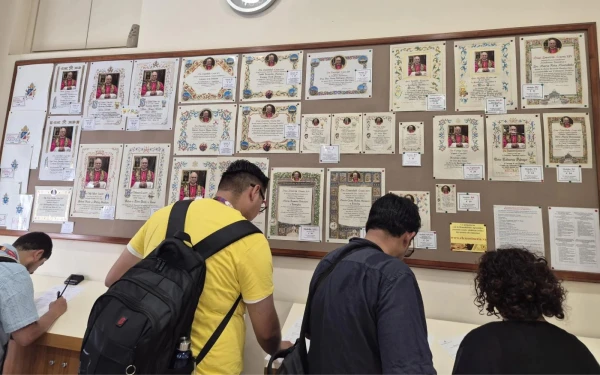The Vatican has seen a boom in the requests of blessings of the new Pope, with at least a 30% increase during the first month of Leo XIV, reflecting the enthusiasm for the beginning of a new pontificate and highlighting a traditional practice that combines devotion with collection of funds for charity works.
In June, the Vatican granted 20,000 applications for papal blessing, compared to 12,000 to 15,000 scrolls distributed in a typical month, something that “had never happened in history,” Cardinal Konrad Krajewski said to CNA – Ewtn News English agency – in an interview this week.
Receive the main news of ACI Press by WhatsApp and Telegram
It is increasingly difficult to see Catholic news on social networks. Subscribe to our free channels today:
The Polish cardinal, responsible for the charitable activities of the Vatican and the granting of certificates of blessing, said that when the office reopened its doors in May after the papal interregno and the election of León, a row of more than 160 meters was formed, which left the building, went down the street and almost reached beyond the door of Sant’anna del Vaticano.

The papal alms office had to close the orders online for about two weeks in June because they could not keep up with the applications, he said. “Everyone wanted the blessing of the new Pope.”
He added that the beginning of the new pontificate coincided with a popular era of the year to receive sacraments, including confirmation, first communion and priestly ordination, which contributed to the increase in demand.
The meaning of a blessing
According to the Catechism of the Catholic Church, the blessings – of people, meals, objects and places – praise God and ask for their gifts.
“In Christ, Christians are blessed by God the Father ‘with all kinds of spiritual blessings.” That is why the Church gives the blessing invoking the name of Jesus and usually making the Holy Sign of the Cross of Christ, “says the Catechism.
For Catholics, said Krajewski, the Blessing of the Pope can have a special meaning, since he is his spiritual father.
“We want to ask for the blessing of the Pope, that we hang at our home and that helps us to cross difficult times,” he said. It helps us to know “that there is someone who bears the name of Jesus, who comes under my roof and blesses me; this is normal, something very human.”
People can receive the blessing of the Pope during a meeting in person, or now even through social networks or television. But having his apostolic blessing on paper, hung in his home, helps people feel “strongly linked to the pontiff, who represents our Lord,” said the cardinal.
He compared a blessing with a mother’s kiss in his son’s hurt knee: he does not necessarily remove the pain of suffering, but the Pope’s closeness expression can give a lot of comfort while people try to live the Christian life.
How a blessing is done
Since the end of the 19th century, the Vatican has granted signed and sealed certificates that grant apostolic blessings to Catholics, generally for a special occasion such as a baptism, marriage, wedding anniversary, first communion or important birthday.

For a while, the Vatican authorized some memories and bookstores close to the Basilica of San Pedro to also sell the blessings, but that practice ended in 2014, and now the only way to request the parchment of Apostolic Blessing It is online or in person in the Office of Papales alms in the city of the Vatican.
While online orders of blessings must be framed in a limited series of categories and only require a personal eligibility statement, Krajewski explained that people can also make requests in person for other reasons, such as a disease. In these cases, the Office of Papal Limosas requires that a pastor or an apostolic nuncio (the Pope’s ambassador to a country) pronounces on the suitability of granting the blessing.
The cardinal said this was to avoid any possibility that someone tried to acquire a certificate of blessing for a scandalous purpose, such as exhibiting it in a hospital where abortions are practiced. The doctors of that hospital need blessings and prayers, Krajewski stressed, but an apostolic blessing on the wall, with a photo of the Pope, could falsely give the impression of papal approval.
After receiving a request for blessing, it takes between two and three weeks to process the order, create the “parchment” (actually, thick paper) and prepare it to be collected or sent by mail.
Part of the preparation includes the writing by hand of the certificates, for which the office uses 11 calligraphs.
Krajewski said that some of the blessing parchments are still completely done by hand, but that most people prefer the most legible computer -produced impression. But all papers contain some elements drawn by hand, such as the initial letter ornate of certain words. The Vatican charges between $ 23 and 35 for each certificate of blessing that distributes, but makes it clear that the cost is a suggested donation, and each penny of the income goes directly to help people suffering from poverty, war or disasters.
“We say that the true blessing is alms,” said Krajewski. “Because every (donation) obtained from the blessings goes to the poor.”
Krajewski, who was appointed papal alms by Pope Francis in 2013, emphasized the enormous help that blessings donations suppose for the charitable works that his office performs. He refused to give exact figures, but said that in 2024 most of the 8 million dollars that his office spent in help worldwide came from blessings.
“We are the first aid of Pope León,” he said. “When something happens in the world (we are) the first help … the ambulance that runs to help.”
A recent project funded by donations, he said, was the support to those affected by the typhoon in Taiwan. Through the Apostolic Nuncio, the Vatican can send money to a country sometimes in terms of hours.
“The Holy Father reminds us that it is not enough to say ‘sorry’, ‘I am united to you’, but (we must also) send concrete help.”
Another recent gift of the Vatican’s charitable arm was a bread oven for the city devastated by the Járkov war (Ukraine). Throughout the war, the Vatican has given food, medical aid and even cash to people fighting in Ukraine, often delivered in a truck driven by Krajewski himself, 61.
“Pope Francis once told me that if this money does not go to the poor, I will end up in hell,” said the cardinal. “Pope Francis was very, very direct. And then, he always asked if our bank account was empty, because if our bank account was empty, it meant that we had helped many people.”
“But blessings help us to be sure to have resources to help and this is something beautiful,” he added.
Translated and adapted by the ACI Press team. Originally published in CNA.

